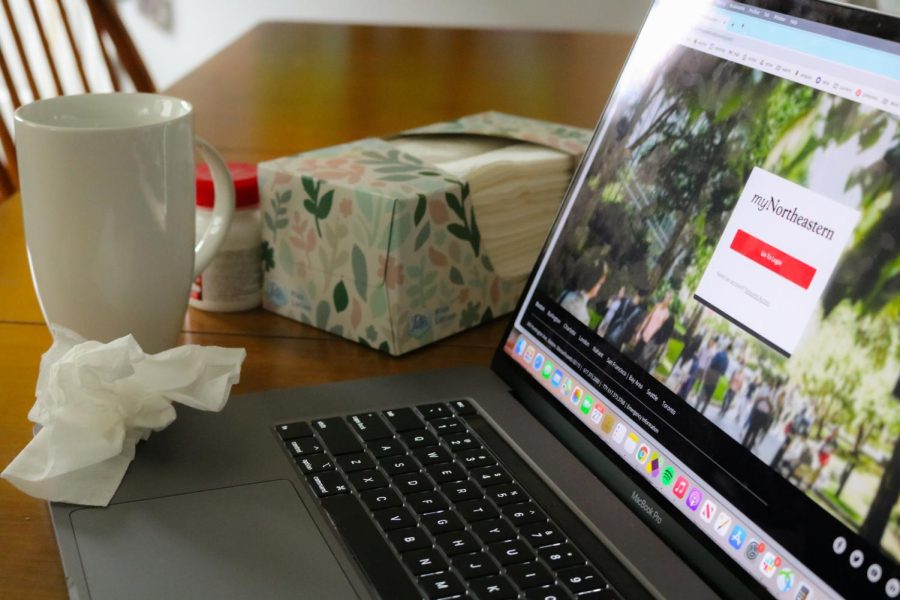Op-ed: Cough, cough don’t spread your sickness to everyone else
Weekly test scheduling and the Daily Wellness Check can be found on the MyNortheastern portal.
October 29, 2021
Among the sounds of pencil on paper, clicking keys and my professor’s voice addressing the 200 students in my 8 a.m. general biology lecture, I can always hear repeated coughs, ranging from wet to dry, and strong sniffles coming from every direction. Even pre-pandemic, especially during the colder seasons, students disregarded direction from schools and advice from parents, opting to show up for classes instead of staying home for fear of falling behind in their academics. But in present times, we should be extra diligent in self-monitoring symptoms, adhering to university policies and being considerate of others by not spreading uncomfortable sickness to peers, especially those who may be immunocompromised.
While Northeastern’s Daily Wellness Check is beneficial in theory, it relies on accurate self-reporting and habitual commitment to completing it. Common cold symptoms, such as a new or worsening cough, runny nose or sore throat, are all listed on the Daily Wellness Check. I have friends who were told to stay home because they had cold symptoms, even if they were fairly sure it was just allergies, until they tested negative for COVID-19 or were cleared by a medical professional. Lying or simply not completing the form at the onset of feeling sick in order to avoid that is too easy.
So, most people who don’t reach symptoms as severe as having a fever end up going to class, dining halls or club meetings. It’s understandable: Missing class may put you behind on lecture notes and discussions, leaving you to make up more work in the future. Some professors record their lectures daily, allowing you to join class via Zoom or rewatch the class after it is uploaded, but others advise you to ask a peer for their notes, forcing students to decide between sitting sick in class or relying on someone else’s interpretation of the lecture.
Most students’ best bet is talking to their professor, as they were instructed to devise plans for potential absences. Professors should make clear that students have the option to stay isolated if they have symptoms to protect both themselves and the remaining students in class, even if they have not tested positive for COVID-19. The pandemic has opened our eyes to virtual platforms and many forms of communication that should stay in place when necessary to protect public health.
Students who test negative but still experience symptoms in following weeks should take advantage of Northeastern’s robust testing system. While not required, you can schedule multiple tests in a week, which can give both sick students and the people around them greater security in their health. While those who are exposed to someone who tests positive for COVID-19 are not required to quarantine, communicating with friends and people you are living with remains important for their wellness.
According to a 2005 study published by the National Library of Medicine, 91% of sampled college students had at least one upper respiratory tract illness from October 2002 to April 2003, which caused 27.8% of them to do poorly on a test and 46.3% to do poorly on an assignment. Showing up to class and potentially infecting others, whether with a common cold or COVID-19, may inflict poor class performance along with stubborn coughs and sore throats.
As the weather gets colder and students spend more time inside, self-care becomes ever more important for the health of all university students. A decrease in sleep makes people more susceptible to illness after exposure to a virus and affects the immune system’s response time. Those sleeping less than seven hours are 2.94 times more likely to develop a cold than those who sleep over eight hours. A study led by Carnegie Mellon University professor Sheldon Cohen found that increased stress limits the body’s response to cortisol, which inhibits the ability to regulate inflammation. As a result, people are more likely to develop a cold when exposed to a virus.
We all want to get back to pre-pandemic learning, but potentially compromising the health and wellness of students to do so is not the way to go. For everyone’s peace of mind, if you have symptoms, stay home until you test negative. Cover your mouth when you cough. If you test negative for COVID-19 but have symptoms, wear your mask, over your nose and mouth, when you are around people — even outside.
Kayla Shiao is a first-year Doctor of Pharmacy student and a member of the The News’ design team. She can be reached at [email protected].


















